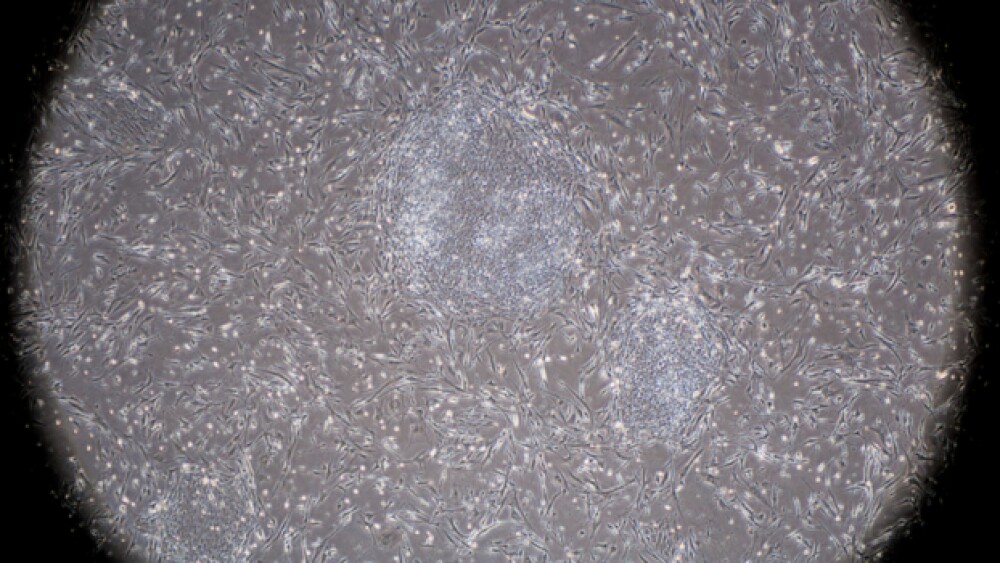Researchers with Iowa-based Cellular Engineering Technologies, the John Paul II Medical Research Institute and the University of Iowa published research in late 2018 describing a safer and ethical method of creating pluripotent stem cells from cord blood and peripheral blood.
One small and one large colony of human induced Pluripotent Stem Cells (iPSCs) in culture on top of mouse feeder cells.
Researchers with Iowa-based Cellular Engineering Technologies (CET), the John Paul II Medical Research Institute (JP2MRI) and the University of Iowa published research in late 2018 describing a safer and ethical method of creating pluripotent stem cells from cord blood and peripheral blood. It was published in the November 29 issue of the journal Regenerative Medicine.
Pluripotent stem cells are master cells, which can create other cells or tissues that the body might need. All stem cells, pluripotent included, can self-renew and create more copies of themselves. There are several types of pluripotent stem cells, including embryonic stem cells. Embryonic stem cells originate from embryos. Most of these are derived from embryos that develop from eggs fertilized via in vitro. Which is at least partly where the John Paul II Medical Research Institute comes in, with the Catholic church’s opposition to embryonic stem cell research that involves the destruction of human embryos. JP2MRI is a non-profit medical research organization also based in Coralville, Iowa that follows the Catholic Church’s guidelines for ethical medical research.
Although most pluripotent stem cells are derived from human embryos that are only a couple days old, others have been developed from fetal tissue older than eight weeks. In 2007, the U.S. National Institutes of Health (NIH) notes, “scientists identified conditions that would allow some specialized adult human cells to be reprogrammed genetically to assume a stem cell-like state. These stem cells are called induced pluripotent stem cells (iPSCs). IPSCs are adult cells that have been genetically reprogrammed to an embryonic stem cell-like state by being forced to express genes and factors important for maintaining the defining properties of embryonic stem cells.”
Alan Moy, who founded both CET and JP2MRI, told LifeSiteNews, a website founded by the Campaign Life Coalition, a conservative Canadian political lobbyist organization, “We have developed a new method to produce safer and non-controversial pluripotent stem cells.”
Moy’s approach adapted a Myc/Lin28-free iPSC reprogramming method for cord blood and peripheral blood. A previous Myc/Lin28-free iPSC reprogramming approach was optimized to convert mononuclear cells (MNC) from cord blood and peripheral blood from patients with genetic lung diseases as cell models of disease.
The iPSC were reprogrammed into ectoderm, definitive endoderm and mesoderm. They also proved that the resultant iPSC were “robust enough to reprogram CBDMNC without purification of CD34+ cells,” according to the study. They further stated that they were “robust enough to create patient and disease-specific iPSC lines from peripheral blood taken from patients with CF (cystic fibrosis) and A1ATD (Alpha-1-antitrypsin deficiency). Oncogene-free and virus-free reprogramming methodology provides patient and disease-specific iPSC for drug discovery and personalized medicine applications with lower risk of oncogenic and viral perturbations that could skew the predictability of cell models of disease.”
CET and JP2MRI are creating a joint venture to develop a private bank to produce iPSCs for lifelong regenerative medicine. Moy told LifeSiteNews, “The new iPSC bio-bank will also allow the consumer to create a personalized iPSC from peripheral blood. Thus, the consumer can still create a lifelong pluripotent stem cell even if they failed to store their cord blood.”
The joint venture will create personalized iPSC from privately banked cord blood and peripheral blood while the donors are young and healthy. Moy indicates that the private iPSC bank will provide diagnostic applications over a lifetime and lead to more efficient drug development and possibly regenerative medicine solutions as the patients get older.
In addition, some of the profits generated from the iPSC bank will be used for JP2MRI to conduct more iPSC research for its therapeutic interests, which include neurodegenerative disease, cancer, rare diseases, and others.
CET is a biotech company also based in Coralville, Iowa. It manufactures human stem cells and proteins for researchers in academia, industry and government. It also offers personalized stem cell bio-banking for consumers.





